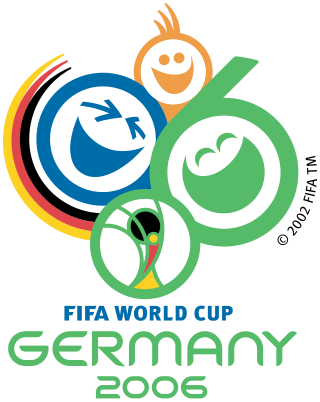
The 2002 FIFA World Cup, also branded as Korea Japan 2002, was the 17th FIFA World Cup, the quadrennial football world championship for men's national teams organized by FIFA. It was held from 31 May to 30 June 2002 at sites in South Korea and Japan, with its final match hosted by Japan at International Stadium in Yokohama.

The 1994 FIFA World Cup was the 15th FIFA World Cup, the world championship for men's national soccer teams. It was hosted by the United States and took place from June 17 to July 17, 1994, at nine venues across the country. The United States was chosen as the host by FIFA on July 4, 1988. Despite soccer's relative lack of popularity in the host nation, the tournament was the most financially successful in World Cup history. It broke tournament records with overall attendance of 3,587,538 and an average of 68,991 per game, marks that stood unsurpassed as of 2022 despite the expansion of the competition from 24 to 32 teams starting with the 1998 World Cup.

The 1970 FIFA World Cup was the ninth edition of the FIFA World Cup, the quadrennial international football championship for men's senior national teams. Held from 31 May to 21 June in Mexico, it was the first World Cup tournament held outside Europe and South America, and it was also the first held in North America. Teams representing 75 nations from all six populated continents entered the competition, and its qualification rounds began in May 1968. Fourteen teams qualified from this process to join host nation Mexico and defending champions England in the 16-team final tournament. El Salvador, Israel and Morocco made their debut appearances at the final stage.

The 1990 FIFA World Cup was the 14th FIFA World Cup, a quadrennial football tournament for men's senior national teams. It was held from 8 June to 8 July 1990 in Italy, the second country to host the event for a second time. Teams representing 116 national football associations entered and qualification began in April 1988. 22 teams qualified from this process, along with host nation Italy and defending champions Argentina.

The 2006 FIFA World Cup, also branded as Germany 2006, was the 18th FIFA World Cup, the quadrennial international football world championship tournament. It was held from 9 June to 9 July 2006 in Germany, which had won the right to host the event in July 2000. Teams representing 198 national football associations from all six populated continents participated in the qualification process which began in September 2003. Thirty-one teams qualified from this process along with hosts Germany for the finals tournament. It was the second time that Germany staged the competition and the first as a unified country along with the former East Germany with Leipzig as a host city, and the 10th time that the tournament was held in Europe.

The FIFA Men's World Ranking is a ranking system for men's national teams in association football, led by Argentina as of April 2023. The teams of the men's member nations of FIFA, football's world governing body, are ranked based on their game results with the most successful teams being ranked highest. The rankings were introduced in December 1992, and eight teams have held the top position, of which Brazil have spent the longest ranked first.

The Greece national football team represents Greece in men's international football matches, and is controlled by the Hellenic Football Federation, the governing body for football in Greece. Starting in 2023, Greece play their home matches in Nea Filadelfeia, a suburb of Athens, at the newly built Agia Sophia Stadium. Greece is one of only ten national teams to have been crowned UEFA European Champions.
In European football, the UEFA coefficients are statistics based in weighted arithmetic means used for ranking and seeding teams in club and international competitions. Introduced in 1979 for men's football tournaments, and after applied in women's football and futsal, the coefficients are calculated by UEFA, who administer football within Europe, as well as Armenia, Cyprus, Israel and the Asian parts of some transcontinental countries.
A group of death in a multi-stage tournament is a group which is unusually competitive, because the number of strong competitors in the group is greater than the number of qualifying places available for the next phase of the tournament. Thus, in the group phase, one or more strong competitors in the "group of death" will necessarily be eliminated, who would otherwise have been expected to progress further in the tournament. The informal term was first used for groups in the FIFA World Cup finals. It is now also used in other association football tournaments and other sports.
To calculate the seeding for the 2002 FIFA World Cup, FIFA used the FIFA World Rankings in combination with performances of national teams in the three previous World Cups. The formula is virtually identical with the one used for the 1998 FIFA World Cup seeding.
For the seeding of qualified teams at the 1998 FIFA World Cup, FIFA used the FIFA World Rankings in combination with performances of national teams in the three previous FIFA World Cups.
The BSWW World Ranking is a ranking system for men's national teams in beach soccer, calculated by the sport's developmental body, Beach Soccer Worldwide (BSWW). The rankings are currently led by Brazil who have held the number one spot since March 2023.
Association football is the most popular sport in almost all North, Central American and Caribbean countries, and eleven members of the Confederation of North, Central American and Caribbean Association Football, CONCACAF, have competed at the sport's biggest event – the men's FIFA World Cup.
The 2016 Copa Libertadores de América was the 57th edition of the Copa Libertadores de América, South America's premier club football tournament organized by CONMEBOL.
The FIFA men's ranking system 2006–2018 was a calculation technique previously used by FIFA for ranking men's national teams in football. The ranking system was introduced by FIFA after the 2006 FIFA World Cup, as an update to an earlier system, and was replaced after the 2018 World Cup with a revised Elo-based system.
The World Football Elo Ratings are a ranking system for men's national association football teams that is published by the website eloratings.net. It is based on the Elo rating system but includes modifications to take various football-specific variables into account, like the margin of victory, importance of a match, and home field advantage. Other implementations of the Elo rating system are possible and there is no single nor any official Elo ranking for football teams.

The inter-confederation play-offs of the 2023 FIFA Women's World Cup qualification determined the final three qualification spots for the 2023 FIFA Women's World Cup. The play-off tournament was used as a test event for New Zealand to host prior to the Women's World Cup. It took place from 18 to 23 February 2023, and featured ten teams split into three groups, with the winner of each group qualifying for the Women's World Cup. New Zealand and guests Argentina also played friendlies against participating teams and each other as part of the event.
The 2021 FIFA Beach Soccer World Cup qualifiers for UEFA was a beach soccer tournament contested by European men's national teams who are members of UEFA that determined the four nations from Europe that qualified to the 2021 FIFA Beach Soccer World Cup in Russia.
Group E of the 2023 FIFA Women's World Cup was one of eight groups that formed the opening round of the tournament with the matches played from 22 July to 1 August 2023. The group consisted of defending world champions the United States, Vietnam, the Netherlands and Portugal. The top two teams, the Netherlands and the United States, advanced to the round of 16.

Group C of the 2022 FIFA World Cup took place from 22 to 30 November 2022. The group consisted of eventual champions Argentina, Saudi Arabia, Mexico and Poland. The top two teams, Argentina and Poland, advanced to the round of 16. This marked the first time that Mexico did not advance past the first round since 1978.








